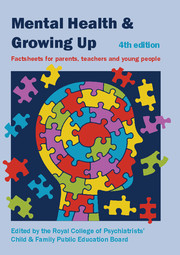Book contents
- Frontmatter
- Contents
- Contributors
- Factsheets for young people
- Factsheets for parents, carers and anyone who works with young people
- 1 Good parenting
- 2 The restless and excitable child
- 3 Dealing with tantrums
- 4 Children who soil or wet themselves
- 5 Sleep problems in childhood and adolescence
- 6 Behavioural problems and conduct disorder
- 7 Attention-deficit hyperactivity disorder (ADHD)
- 8 The child with general learning disability
- 9 Specific learning difficulties
- 10 Autism and Asperger syndrome
- 11 Depression in children
- 12 Worries and anxieties: helping children to cope
- 13 Divorce or separation of parents: the impact on children and adolescents
- 14 Death in the family: helping children to cope
- 15 The emotional cost of bullying
- 16 Traumatic stress in children
- 17 Domestic violence: its effects on children
- 18 Child abuse and neglect: the emotional effect
- 19 Drugs and alcohol: what parents need to know
- 20 Self-harm in young people
- 21 Psychosis
- 22 Schizophrenia
- 23 Bipolar disorder in children and adolescents
- 24 Obsessive–compulsive disorder in children and young people
- 25 Eating disorders in young people
- 26 Chronic physical illness: the effects on mental health
- 27 Medically unexplained physical symptoms
- 28 Chronic fatigue syndrome: helping your child get better
- 29 Parental mental illness: the problems for children
- 30 Who's who in CAMHS
15 - The emotional cost of bullying
from Factsheets for parents, carers and anyone who works with young people
Published online by Cambridge University Press: 02 January 2018
- Frontmatter
- Contents
- Contributors
- Factsheets for young people
- Factsheets for parents, carers and anyone who works with young people
- 1 Good parenting
- 2 The restless and excitable child
- 3 Dealing with tantrums
- 4 Children who soil or wet themselves
- 5 Sleep problems in childhood and adolescence
- 6 Behavioural problems and conduct disorder
- 7 Attention-deficit hyperactivity disorder (ADHD)
- 8 The child with general learning disability
- 9 Specific learning difficulties
- 10 Autism and Asperger syndrome
- 11 Depression in children
- 12 Worries and anxieties: helping children to cope
- 13 Divorce or separation of parents: the impact on children and adolescents
- 14 Death in the family: helping children to cope
- 15 The emotional cost of bullying
- 16 Traumatic stress in children
- 17 Domestic violence: its effects on children
- 18 Child abuse and neglect: the emotional effect
- 19 Drugs and alcohol: what parents need to know
- 20 Self-harm in young people
- 21 Psychosis
- 22 Schizophrenia
- 23 Bipolar disorder in children and adolescents
- 24 Obsessive–compulsive disorder in children and young people
- 25 Eating disorders in young people
- 26 Chronic physical illness: the effects on mental health
- 27 Medically unexplained physical symptoms
- 28 Chronic fatigue syndrome: helping your child get better
- 29 Parental mental illness: the problems for children
- 30 Who's who in CAMHS
Summary
What does it mean that someone is being bullied?
Children who bully may:
• hit or punch another child
• kick them or trip them up
• take or spoil their things
• call them names
• tease them
• give them nasty looks
• threaten them
• make racist remarks about them
• spread nasty rumours or stories about them
• not let them join in play or games
• not talk to them – ‘send him to Coventry’
• sending repeated false or obscene messages on the phone or internet/social networking sites.
How common is bullying?
Bullying is very common and can happen in all schools. Surveys in England have shown that half of primary school pupils and one in ten secondary school pupils are being bullied.
Why does it happen?
There is no single reason why some children become bullies or victims. Children who are aggressive are more likely to become bullies. They pick on children who appear different in some way – those who are quiet, shy, alone at playtime, and unable to defend themselves. Children who have an illness or disability or who are obese are also more likely to be bullied.
What effects does bullying have?
Being bullied can seriously affect a child's physical and mental health. This can include:
• feeling sad and lonely
• lacking confidence and feeling bad about themselves
• becoming depressed
• complaining of various physical symptoms, such as headaches or stomach aches
• worrying and trying to avoid going to school.
These problems can carry on long after the bullying has stopped.
Who and what can help?
Parents
• Be open to the possibility that your child might be being bullied. Some parents may not think of bullying as a possible reason for their child's distress.
• Listen. One of the most important things you can do is to listen to your child if they say they are being bullied. It can be very difficult for them to talk to anyone about it.
• Take your child seriously. Many children suffer in silence for a long time before they tell anyone. They may be ashamed, embarrassed, and may believe that they deserve it. Many children are frightened of telling someone what is happening because they fear the bullies will find out and hurt them even more. It can take great courage to tell an adult.
- Type
- Chapter
- Information
- Mental Health and Growing UpFactsheets for Parents, Teachers and Young People, pp. 90 - 92Publisher: Royal College of PsychiatristsPrint publication year: 2013



